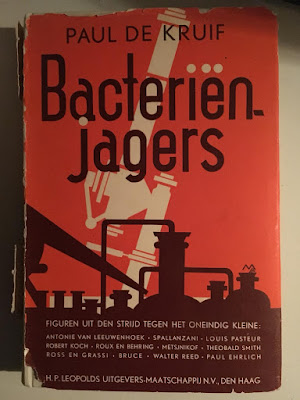I mentioned in a previous post our fellow travelers on our trip to Ameland. Old friends, stout bicyclers, wonderful company, and microbiological missionaries to boot. I'd known that Remco and Coosje were both deeply involved in (indeed, founded) the Yoba For Life non-profit, but it was not until I arrived in the Netherlands and secured a copy of De Microbe Mens, Remco's paean to bacteria (and, not to be forgotten, yeasts, algae, and fungi, too) that I understood that story in full, along with much else about his career as a microbiologist.
A short but rich book, De Microbe Mens ("The Microbe Man") explores and explains the relationship between the microbial world and our own. Actually, as Remco beautifully illustrates, that distinction is wholly false: we exist under almost all circumstances within a world of microbes, and are ourselves walking ecosystems that they populate and, to a surprising degree, control. Much to his (and my) chagrin, that false distinction has led to a culture of "hygiene" that is patently unhealthy and ecologically destructive. Rather than detail his arguments, let me extract and summarize his advice: don't use everyday products with "antimicrobial" agents; make only very careful use of medical antibiotics; eat with great variety so as to encourage a vibrant internal flora, and avoid preservative-laden foods; air quality issues not to be forgotten, introduce external ventilation into your living spaces; route yourself preferentially through bacterially rich environments; and get educated.
Sadly, you probably cannot get educated by reading Remco's book: it's only available in Dutch, and he has no plans to translate it. There are other sources of information on the topic, of course, but I don't know of a better one and you will miss in any case Remco's inimitable voice. Here an extract:
A rotor allows the tail to turn on its axis and the bacteria can in this fashion with a spinning tail bore through the water like a corkscrew. It the tail turns counterclockwise the bacteria swims in a straight line. Clockwise, the bacteria tumbles. The tail's direction of turn is determined by signals from the bacteria's environment, and on that basis the bacteria swims straight or tumbles. The trajectory of a bacteria we can view as a wise life lesson: if you less often change your direction in response to an improved environment you will eventually reach your ideal. (p. 37)As someone who tumbles a good deal, there's much in just this one paragraph for me. And while I'm not in a position to affirm Remco's scientific credentials, my (reading) Dutch is good enough to let me judge how well someone writes; as well, I've read a lot of the great "popular science" works by the (mostly dead) immortals, including Gould, Sacks, and Dawkins (before he got rabid about the whole atheism thing). Remco ranks. And not only does he rank, he is of a kin with the writer and the book that got me started in my lifelong love of this important genre, shown here in both English and Dutch editions (the latter photo supplied by Remco himself):
Microbe Hunters, recommended to me by my father (but not yet taken up by either of my boys), was the first book about science I ever read, and it set in train interests that led me to and through a doctoral program in Science and Technology Studies (aka "reading and writing about science and technology"). To discover that one of my besties has now emerged, a la de Kruiff, as a Dutch author writing a popular explanation of microbiology is simply delicious.
De Microbe Mens is about microbes and man, but it's also about a microbe-man, Remco himself. Two of the six chapters total are taken directly from Remco's own life. One is about his work on Yoba, the other about how he became and what he has done as a microbiologist. Remco tells me that many Dutch critics were disapproving of what they took as self-aggrandizement. These critics cannot have read much other popular science (and certainly not a word of Sacks') nor honestly asked themselves if these chapters helped or hurt the book. To my taste they serve not only as Remco's bona fides but also as inspiring and even exciting stories in themselves, offering a rare readable glimpse into the scientific process and its application.
I love the book, I love Remco, and thanks to the two I now love our little friend and sometimes master, the microbe.



Haven't yet started but will read it soon! Something tells me my mother will love it (former employee at one of the labs of the Amsterdam Antoni van Leeuwenhoek Instituut)
ReplyDelete